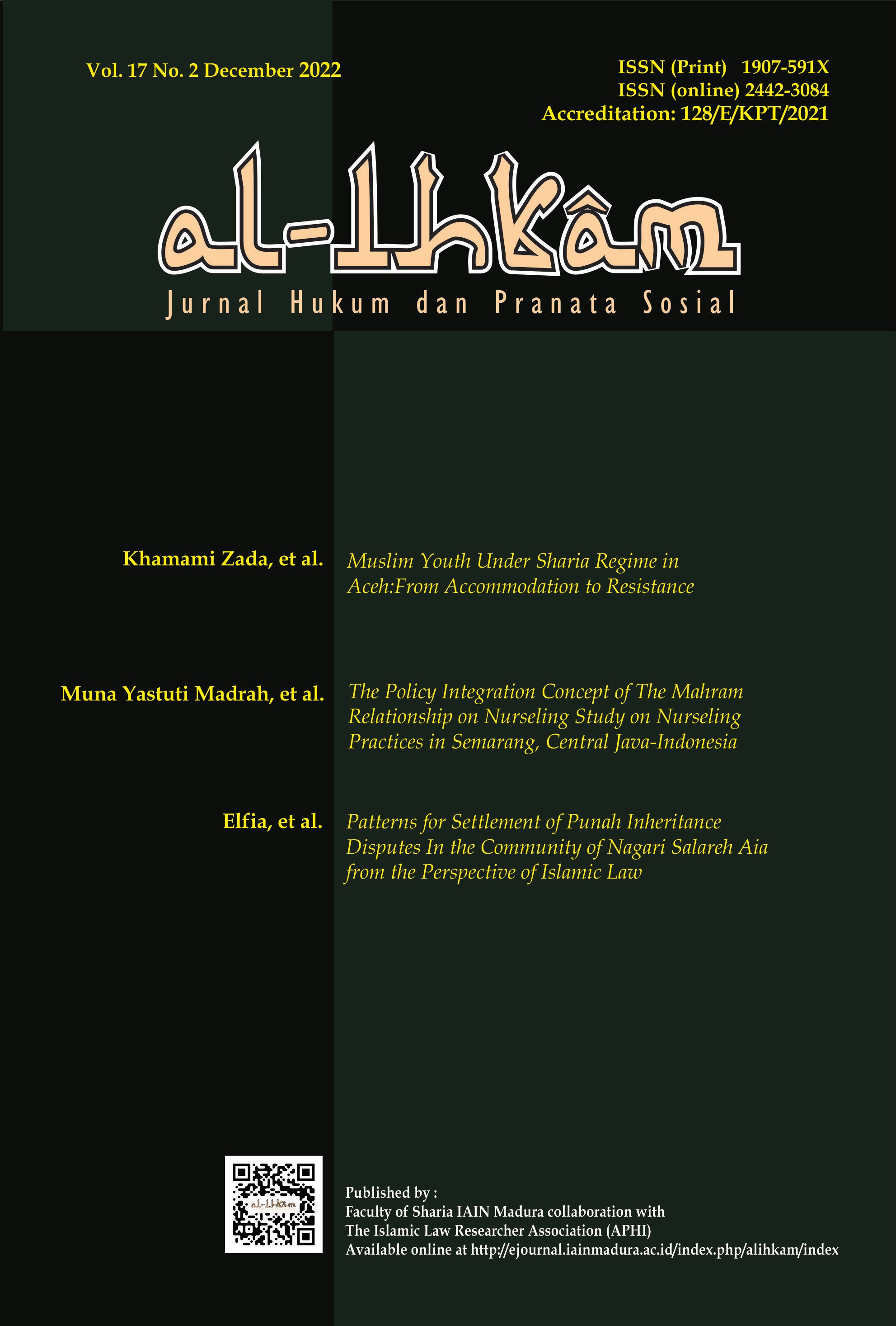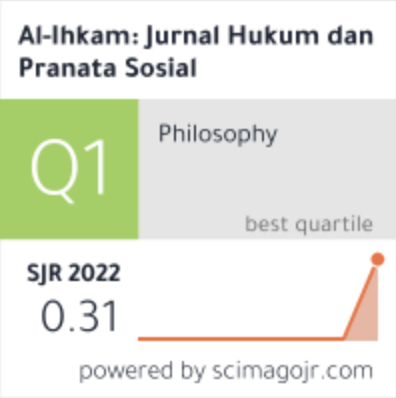A Critical Analysis of Islamic Law and Fatwa of MUI (Majlies Ulama Indonesia) & NU (Nahdlatul Ulama’) on A Gold-Backed Cryptocurrency (OneGram)
 Abstract views: 1266
,
Abstract views: 1266
,
 PDF downloads: 627
PDF downloads: 627
Abstract
Cryptocurrency is a result of recent development of digitalization in the financial transaction. OneGram is a part of it that uses gold instruments to back up and maintain its value stable. The purpose of this study is to explore how Islamic law and MUI & NU, through their fatwa, percieve the OneGram. This research uses a qualitative approach to gain a deep understanding of the OneGram by using secondary data collected from the Quran, hadith, relevant academic journals according to Islamic law and fatwas from both organization. The results of this study state that OneGram is allowed by Islamic law and the fatwa to be used as digital payment system. OneGram is furthermore supervised by shariah supervisory board to avoid gharar (uncertainty) and maysir (gambling) in maintaining its value. The unique fact from this digital currency is that the use of gold in transaction had been applied in the time of Prophet Muhammad SAW. From this digital development, OneGram as a gold-backed cryptocurrency can revive the function of dinar as currency. OneGram transforms the gold value in dinar coin which physically has no flexibility in today transaction to the gold value in digital platform which has flexibility in digital transaction with broad accesability.
Downloads
References
Abdel. “Fatwa on Bitcoin.” Available at: Https://Gate.Ahram.Org.Eg/News/1764841.Aspx, 2018.
Abdul Mukti Thabrani. “Maqâshid Revitalization in Global Era: Istidlâl Study from Text to Context.” Al Ihkam : Jurnal Hukum Dan Pranata Sosial 13, no. 2 (2018). https://doi.org/https://doi.org/10.19105/al-lhkam.v13i2.1814.
Abdullah, Adam. “The Islamic Monetary Standard: The Dinar and Dirham” 6 (April 2020): 1–29. https://doi.org/10.25272/ijisef.659330.
Abu-Bakar, Mufti Muhammad. “Shariah Analysis of Bitcoin, Cryptocurrency, and Blockchain.” Blossom Labs, Inc 1 (2018): 21.
Adam, Mufti Faraz. “Bitcoin: Shariah Compliant.” Amanah Finance Consultancy 2017 (2017): 1–54.
Ahmed. “Bitcoin: Shariah Complaint?”, Working Paper,.” Available at: Https://Afinanceorg.Files. Wordpress.Com/2017/08/Research-Paper-on-Bitcoin-Mufti-Faraz-Adam.Pdf, 2017.
Akhter, Md Uddin. “Principles of Islamic Finance: Prohibition of Riba, Gharar and Maysir.” Munich Personal RePEc Archive, no. 67711 (2015): 1–8.
Al-Ghazali. Ihya ‘Ulumudin (Terjemahan). Bandung: Pustaka, 2005.
Aloui, Chaker, Hela ben Hamida, and Larisa Yarovaya. “Are Islamic Gold-Backed Cryptocurrencies Different?” Finance Research Letters 39 (2021): 1–16. https://doi.org/10.1016/j.frl.2020.101615.
Asif, Sudais. The Halal and Haram Aspects of Cryptocurrencies in Islam, 2018. https://doi.org/10.13140/RG.2.2.29593.52326.
Aspers, Patrik, and Ugo Corte. “What Is Qualitative in Qualitative Research.” Qualitative Sociology 42 (June 2019). https://doi.org/10.1007/s11133-019-9413-7.
Baker. “In Blockchain We Trust.” Available at: Https://Nzbusiness.Co.Nz/, 2019.
Bawafi, Habib. “DINAMIKA METODE ISTIMBATH AHKAM LEMBAGA BAHTSUL MASAIL NU.” Jurnal Al-Fikrah 8, no. 5 (2019): 55.
BEDOUI, Houssem eddine, and Aroua Robbana. “Islamic Social Financing Through Cryptocurrency,” 259–74, 2019. https://doi.org/10.1007/978-3-030-10749-9_16.
Bouri, Elie, Rangan Gupta, and David Roubaud. “Herding Behaviour in Cryptocurrencies.” Finance Research Letters 29 (2019): 216–21. https://doi.org/https://doi.org/10.1016/j.frl.2018.07.008.
“Cnbc Indonesia,” 2021.
Corbet, Shaen, Brian Lucey, and Larisa Yarovaya. “Datestamping the Bitcoin and Ethereum Bubbles.” Finance Research Letters 26 (2018): 81–88. https://doi.org/https://doi.org/10.1016/j.frl.2017.12.006.
Crowther, Geoffrey Sir. “An Outline Of Money,” 1940.
Das, Debojyoti, Corlise Le Roux, R K Jana, and Anupam Dutta. “Does Bitcoin Hedge Crude Oil Implied Volatility and Structural Shocks? A Comparison with Gold, Commodity and the US Dollar.” Finance Research Letters 36, no. C, (2020): S1544612319306725.
Evans, Charles W. “Bitcoin in Islamic Banking and Finance,” 2015.
Fatwa Syabakah Islamiyah 21932, n.d.
Fatwa Syabakah Islamiyah 251170, n.d.
H, Darmawati. “Manhaj Bahsul Masail Menurut Nahdatul Ulama (NU).” Sulesana: Jurnal Wawasan Keislaman 6, no. 2 (2011): 98–112.
Hariyanto, Erie. “Public Trust in the Religious Court to Handle Dispute of Sharia Economy.” AHKAM : Jurnal Ilmu Syariah 22, no. 1 (2022): 185–208. https://journal.uinjkt.ac.id/index.php/ahkam/article/view/26216/10512.
Hasan. Al-Auraq Al-Naqdiyah Fi Al-Iqtishad Al-Islamy, Mata Uang Islami: Telaah Komprehensif Sistem Keuangan Islami. Jakarta: Grafindo Persada, 2005.
Ibrahim Alzubaidi, Ibrahim Bassam. “DEVELOPING DIGITAL CURRENCY FROM AN ISLAMIC PERSPECTIVE : THE CASE OF BLOCKCHAIN TECHNOLOGY BY IBRAHIM BASSAM IBAHIM ALZUBAIDI A Research Paper Submitted in Fulfilment of the Requirement for the Degree of Master of Science ( Islamic Banking and Finance ),” no. September (2017).
Ibrahim, Azharsyah, and Abdul Jalil Salam. “A Comparative Analysis of DSN-MUI Fatwas Regarding Murabahah Contract and the Real Context Application (A Study at Islamic Banking in Aceh).” Samarah 5, no. 1 (January 1, 2021): 372–401. https://doi.org/10.22373/SJHK.V5I1.8845.
ISRA. Sistem Keuangan Islam Prinsip & Operasi. Jakarta: Grafindo Persada, 2015.
Kakkattil, Shajahan K. Halal Cryptocurrency Management. Halal Cryptocurrency Management. Springer International Publishing, 2019. https://doi.org/10.1007/978-3-030-10749-9.
Lihasanah, Ahsan. Al-Fiqh Al-Maqashidi Indal Al-Syathibi,. Kairo: Darus Salam, 2000.
Limon. “The Wild West: Understanding Cryptocurrencies and Their Implications on Financial Planning.” Journal of Financial Planning, Vol. 1, pp (2018).
Lucero, Miguel Angel Garcia-Ramos. “Cryptocurrencies Regulation in the Islamic Environment: OneGram Case Study.” Journal of the Sociology and Theory of Religion 11 (2021).
Ma’mun, Sukron. “ILHAQ DALAM BAHTSUL MASA’IL NU; ANTARA IJTIHAD DAN IKHTIYAT.” Al Qalam 28, no. 1 (2011): 63–86.
Ma, Mohd, and Sum Billah. Halal Cryptocurrency Management. Halal Cryptocurrency Management. Springer International Publishing, 2019. https://doi.org/10.1007/978-3-030-10749-9.
Nurhisam, Luqman. “Bitcoin : Islamic Law Perspective.” Qudus International Journal of Islamic Studies 5, no. 2 (2017): 85–100.
Popper, Nathaniel. Digital Gold : Bitcoin and the inside Story of the Misfits and Millionaires Trying to Reinvent Money . Bitcoin and the inside Story of the Misfits and Millionaires Trying to Reinvent Money. First edit. New York, NY: Harper, an Imprint of HarperCollins Publishers, 2015.
Pratomo, Hilmy. “Transformasi Metode Bahtsul Masail Nu Dalam Berinteraksi Dengan Al-Qur’an.” Jurnal Lektur Keagamaan 18, no. 1 (2020): 109–34. https://doi.org/10.31291/jlk.v18i1.620.
Preece, Abdul Shakour, and Popoola Kareem Hamed. “Journal of Islamic Thought and Civilization of the International Islamic University Malaysia (IIUM).” Journal of Islamic Thought and Civilization of the International Islamic University Malaysia (IIUM) 24, no. 1 (2019): 287–307.
Q&A. “Tanya Jawab Siaran Pers Bank Indonesia No. 20/4/DKom, Bank Indonesia Memperingatkan Kepada Seluruh Pihak Agar Tidak Menjual, Membeli Atau Memperdagangkan Virtual Currency. 2018. Jakarta: Departemen Komunikasi.” 2018.
Raheja, Rinku, Abhishek Agarwal, and Saurabh Vaish. “CRYPTOCURRENCY AND ITS USAGE AS AN ALTERNATIVE CURRENCY,” no. 03 (2022): 2316–21.
Shodiq. “Sharia Rulings on Cryptocurrencies. Retrieved from PbAgusRistono*,”Design Of Reliable And Efficient Manchester Carry Chain Adder Based 8-Bit Alu For High Speed Applications.” Journal Of VLSI Circuits And Systems, 2018.
Siswantoro, Dodik, Rangga Handika, and Aria Farah Mita. “The Requirements of Cryptocurrency for Money, an Islamic View.” Heliyon 6, no. 1 (2020): e03235. https://doi.org/10.1016/j.heliyon.2020.e03235.
Student, GAZI AMALIN. “The Legality of Cryptocurrency Trade in Accordance,” 2018, 108.
Swan, Melanie. “Blockchain Economic Theory: Digital Asset Contracting Reduces Debt and Risk,” 2019, 3–23. https://doi.org/10.1142/9781786346391_0001.
Virgana, R. A.E., Mohd Haizam Mohd Saudi, and Obsatar Sinaga. “Conceptual Research: Sharia-Based Cryptocurrency.” Journal of Advanced Research in Dynamical and Control Systems 11, no. 3 Special Issue (2019): 138–43.
Copyright (c) 2022 AL-IHKAM: Jurnal Hukum & Pranata Sosial

This work is licensed under a Creative Commons Attribution-ShareAlike 4.0 International License.
In order to be accepted and published by Al-Ihkam: Jurnal Hukum dan Pranata Sosial, author(s) submitting the article manuscript should complete all the review stages. By submitting the manuscript, the author(s) agreed to the following terms:
- The copyright of received articles shall be assigned to Al-Ihkam: Jurnal Hukum dan Pranata Sosial as the publisher of the journal. The intended copyright includes the right to publish articles in various forms (including reprints). Al-Ihkam: Jurnal Hukum dan Pranata Sosial maintain the publishing rights to the published articles.
- Authors are permitted to disseminate published articles by sharing the link/DOI of the article at Al-Ihkam: Jurnal Hukum dan Pranata Sosial. Authors are allowed to use their articles for any legal purposes deemed necessary without written permission from Al-Ihkam: Jurnal Hukum dan Pranata Sosial with an acknowledgment of initial publication to this journal.
- Users/public use of this website will be licensed to CC-BY-SA.



.png)
_1.png)










